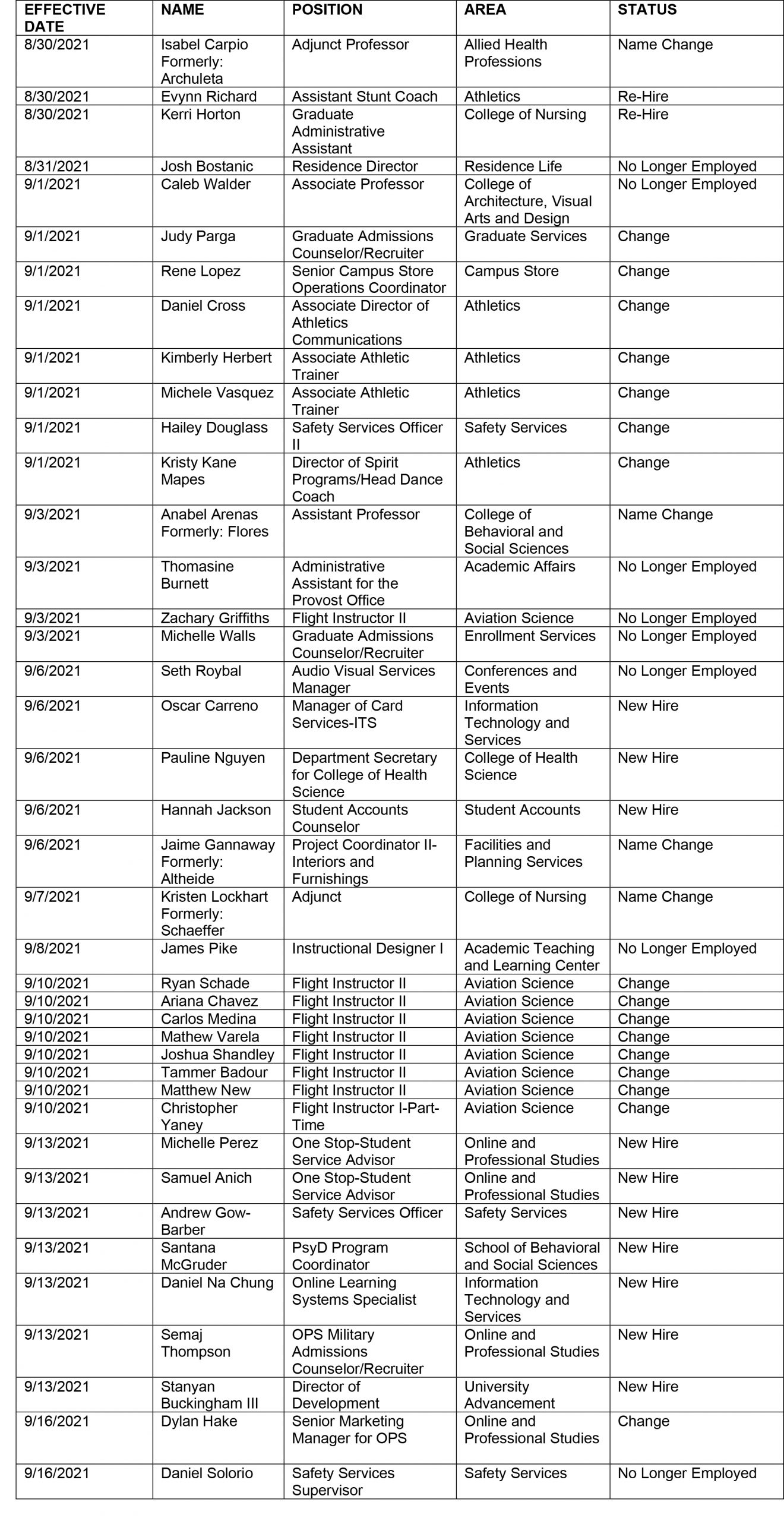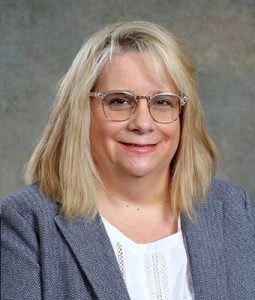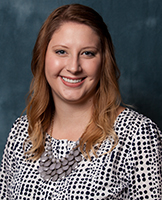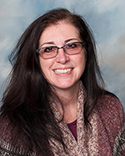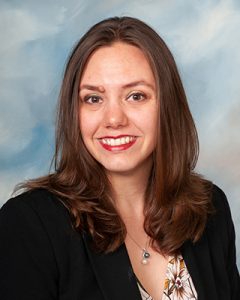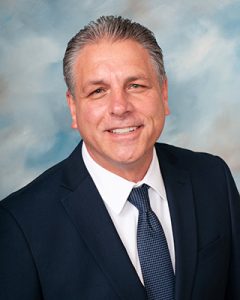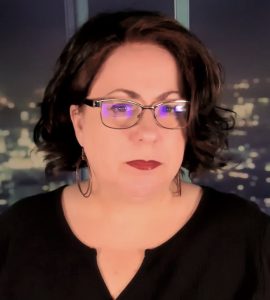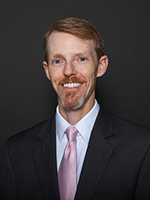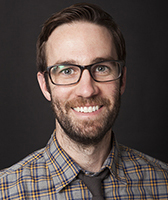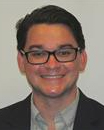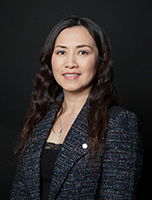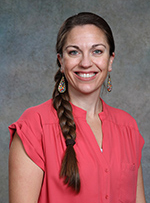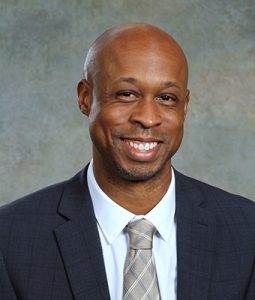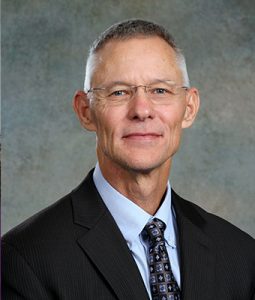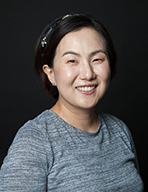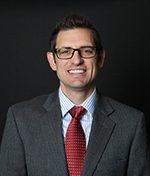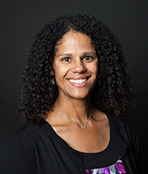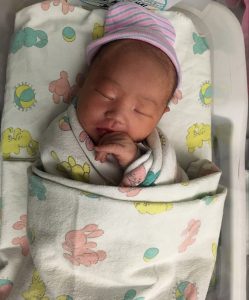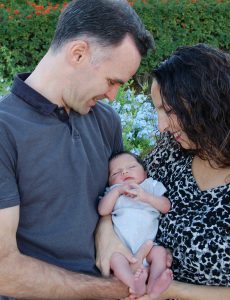In this issue…
Current News
CBU Fall 2021 enrollment extends record-setting pattern
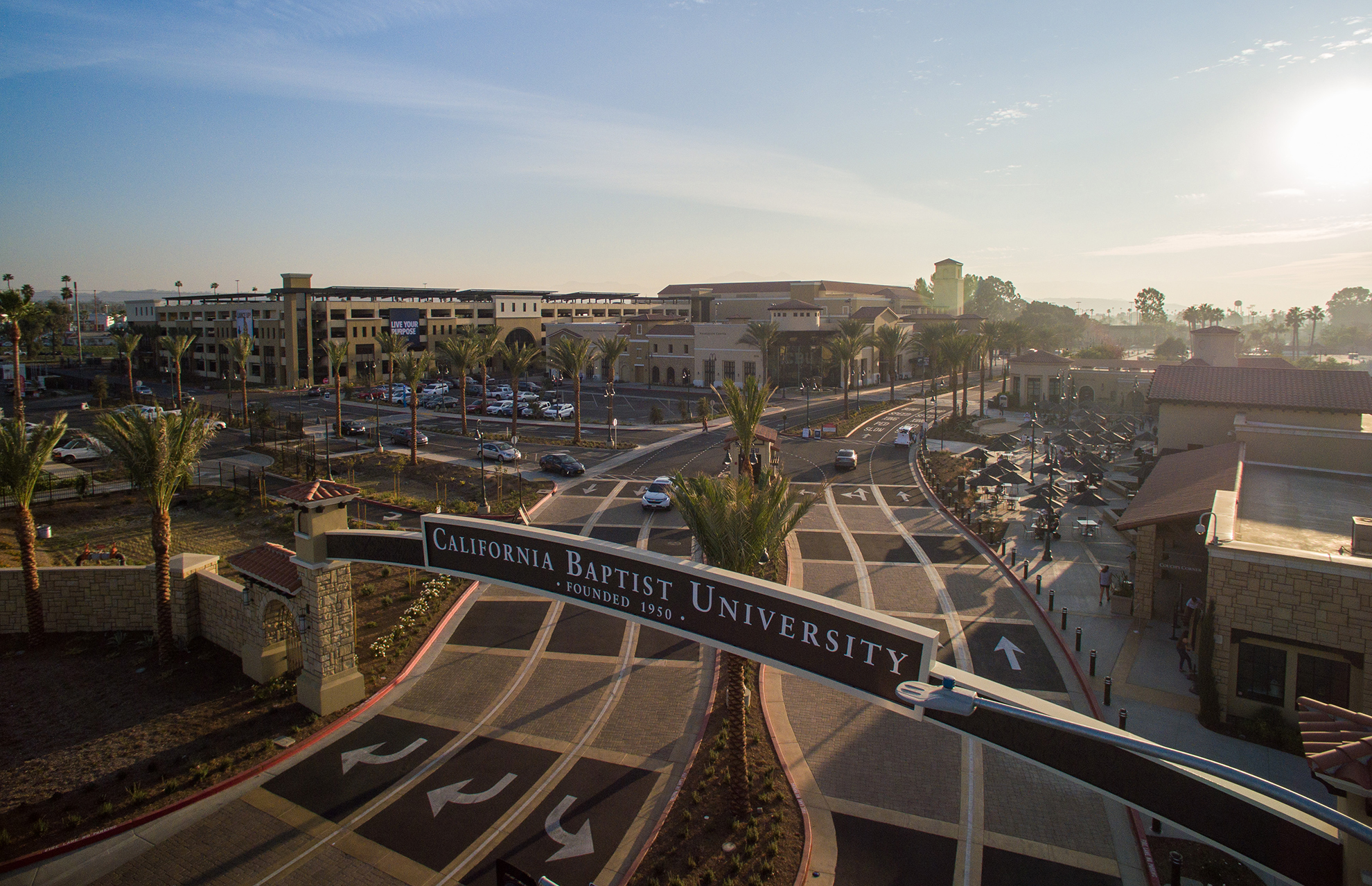 California Baptist University posted another record enrollment along with the return to in-person instruction this year, Dr. Ronald L. Ellis, CBU president, announced today.
California Baptist University posted another record enrollment along with the return to in-person instruction this year, Dr. Ronald L. Ellis, CBU president, announced today.
At the regular fall meeting of the CBU Board of Trustees, Ellis announced that Fall 2021 enrollment totaled 11,491 students. That figure is 174 greater than the fall 2020 enrollment and a year-over-year increase of 1.5 percent.
“Fall 2021 is another record-breaking enrollment increase on top of a sustained twenty-seven years of significant increases and puts CBU ahead of schedule to attain the 12,000 by 2025 goal,” Ellis said.
This year’s triple-digit increase follows three years of 600-plus enrollment increases (610, 698, 618), one four-digit increase (1,113), six three-digit increases (813, 584, 616, 784, 545, 559), and the Fall 2020 increase of 272. Combined with the current year’s increase of 174 students, CBU enrollment has grown 7,386 on a base of 4,105 in Fall 2009 — an increase of 180 percent in 12 years.
During the 71-year history of the institution, there have been 20 triple-digit or greater year-over-year increases, all since Fall 1995.
Since Ellis arrived as president in November 1994, CBU enrollment has grown by 10,683 from 808 to 11,491, which is 14.22 times larger.
Counseling Center director discusses coping with a pandemic
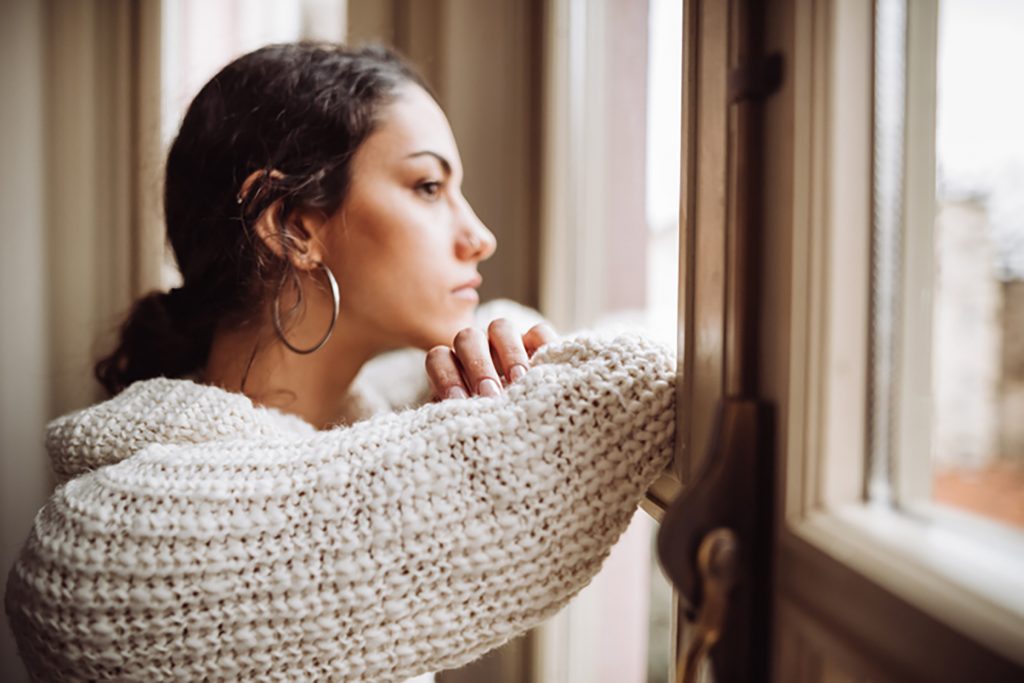
As students at California Baptist University settle into the new school year, life almost seems back to normal while dealing with a pandemic. Students are busy with classes, school activities and socializing.
Dr. Jeff Biddle, director of the Counseling Center, discusses what the Lancer community may still be coping with emotionally and mentally.
A lot has happened in the past 18 months. What should students expect?
New students are experiencing a flood of emotions, but a predominant one is anxiety resulting from a loss of normalcy. Their entire senior year in high school during the pandemic was not normal, with canceled dances and football games, a confusing graduation experience and the online learning experience. The accumulation of losses has interfered with social interactions and their sense of belonging, as well as created loneliness and magnified anxiety, thus creating a vicious cycle.
Normalcy fosters equilibrium in our daily lives. It creates a sense of predictability, routine and rhythm, which can stabilize our emotions through knowing what to expect. Normalcy doesn’t mean we don’t experience the ups and downs of life, but the pandemic has additionally forced us to maintain an “expect the unexpected” state of mind.
Now, as new students step onto CBU’s campus, they are still holding the “expect the unexpected” mindset. Although college life can be an amazing and fulfilling experience, it is new and requires time for adjustment, even without taking into account all the changes from the pandemic.
Meanwhile, all students may experience a mixture of “I’m excited, and I’m apprehensive.” Then they ask, “Can I give myself permission to be excited because I can’t trust what’s going to happen?”
With that much loss, there is a corresponding need to grieve. I see many students trying to navigate how to put words to their feelings and thoughts and maybe not even understanding that they need to process and grieve.
Why is it important to grieve?
A good definition for grieving is acknowledging the loss of precious things of significant meaning, such as people, environments, relationships and, yes, even normalcy. Grieving well is identifying and sharing these losses with another person, whether it’s a therapist, friend, professor, Bible study leader or anyone you respect who is safe and listens well. Barriers to grieving can be our belief systems that say, “You’re too sensitive,” or “Just get over it,” or “Other people have it worse than me,” or “You don’t have time for this.”
But if we don’t grieve, our emotions will begin to manifest physically, such as through headaches, body aches, migraines, gastrointestinal issues and sleep issues. The body keeps score. Physical symptoms may be signaling emotional pain going on underneath the hood of our hearts. In a sense, students might be duct taping over that blinking red check engine light while the body begins to malfunction.
What emotions or thoughts would be considered normal, and when should students seek help?
It’s normal to feel abnormal. We do not live in a world with just healthy people and unhealthy people. We live in a world where at some level we’re all broken. We’re all entering a crisis, in a crisis, or recovering from a crisis. The sooner we admit that the better chance we have of healing.
I love to look college students in the eye and say, “You’re not crazy. In light of what you’ve been going through, it’s normal to feel this level of pain.” Normalizing for a person in distress and offering them hope is often the beginning of recovery. I also communicate that it is not normal to try to heal in isolation: God always intended and designed us to heal in community.
On a practical note, if a student is experiencing emotional pain for two weeks or more, with no relief in sight, it’s time to seek help.
Why is it important to reach out?
Studies show 80% of people who suffer through a mental health issue will heal if they seek help. It doesn’t have to be counseling; it could be just reaching out to a safe person who deeply cares for you.
There’s something transformative and healing in simply communicating our pain to another person.
If you are a friend of someone in crisis, congratulations, you have now become a first responder! It is your privilege to listen, encourage and assist them in finding help.
Another statistic is that 40% of university students who are struggling with mental health issues do not reach out. They are the ones that have isolated themselves and that’s the 40% that worries me most.
What services are available for students at the Counseling Center?
In addition to in-person or telehealth counseling sessions, the Counseling Center provides anonymous online assessments that can help students determine their emotional state. The WellTrack app (free to CBU students) is a self-help online therapy option that allows students to track their mental health. The Center, which has 26 counselors, also offers support groups focusing on processing loss and dealing with anxiety due to the pandemic.
Anything you would like to add?
I encourage students to be courageous enough to reach out. Realize that it is normal to struggle with emotions, and it’s essential to be in a supportive community.
Faculty look at community and rights for Constitution Day
 A panel of faculty members at California Baptist University discussed the Constitution and how it addresses the common good and individual rights.
A panel of faculty members at California Baptist University discussed the Constitution and how it addresses the common good and individual rights.
Dr. Kenya Davis-Hayes, professor of history; Dr. Troy Hinrichs, professor of criminal justice; Dr. Chase Porter, assistant professor of political science; and Dr. Amy Stumpf, professor of society and religion, spoke at a Constitution Day event on Sept. 17. The annual observance marks the signing of the U.S. Constitution on Sept. 17, 1787.
Dr. Chris McHorney, chair of the Department of History and Government, moderated the discussion titled “Who Are We the People? Communitarianism, Individualism and the Constitution.” Porter said the goals of general welfare and of individual rights are “inevitably” in conflict.
“To secure the welfare of all of the nation is going to require limitations on individual liberty within the nation,” Porter said. “Where I think we politically divide in America is, how expansive do we want the promotion of general welfare to be? The more expansive we want general welfare to be, to some extent, the more constraining we’re going to have to be on individual liberty. I don’t think you can have those two concepts without some sort of conflict. You just have to decide how much of a conflict you’re comfortable with.”
Stumpf said she saw these goals—general welfare and individual rights—more as cooperating.
“They’re working together. Liberty is just a part of the common good or the common welfare and we would want liberty for other people as well as ourselves,” Stumpf said. “And it has to come at a price. The common good is not free. Whether it’s through political means or economic and taxation, it comes at a price.”
Davis-Hayes said as Americans, people often don’t think about the tension between general welfare and liberty until extreme situations occur. The pandemic has brought the tension, but so did rationing during World War II.
“In modern America … we forget overall that that we already have a society that’s working towards a general welfare,” Davis-Hayes said. “But then when something happens and you’re required to overtly work towards the general welfare, we have these very amazing and high stress conversations about the tension between the two.”
The panel also discussed how the perspective of Christianity should affect how to interpret rights and the common good.
“When I look at what the Scriptures say about loving my neighbor, honoring them, helping them stay healthy, respecting their needs, it trumps what [the Constitution] about my rights,” Stumpf said. “Jesus said it’s good for my neighbor, so do it.”
Hinrichs said that while people need to care for others, he was concerned about having the government make people do certain things.
“When you give the government that much power, where does it stop?” Hinrichs asked. “Just look at the growth of the government since the American Civil War. It brings a lot of weight, and it never goes back to what it was before.”
Porter agreed he did not want the government enforcing morality in some issues, but he also felt that Christians need to do their part.
“My concern as a Christian is not how the government is handling the response to COVID. … [My concern is] how I, as an individual Christian, am responding to COVID. I can certainly go above and beyond what the government calls for me morally,” Porter said.
Davis-Hayes said Christians are called to always be salt and light. Members of the Department of History and Government encourage students to go into government and to bring in a Christ-centered worldview, “to kind of nudge our society in ways that are both legal and moral,” she said.
“I think that’s the best that we can do, hopefully without overreach … to legislate in a way that balances the general welfare and individual liberty, as difficult as that is. That’s the tension,” Davis-Hayes said.
CBU remembers 20th anniversary of the 9/11 terrorist attacks
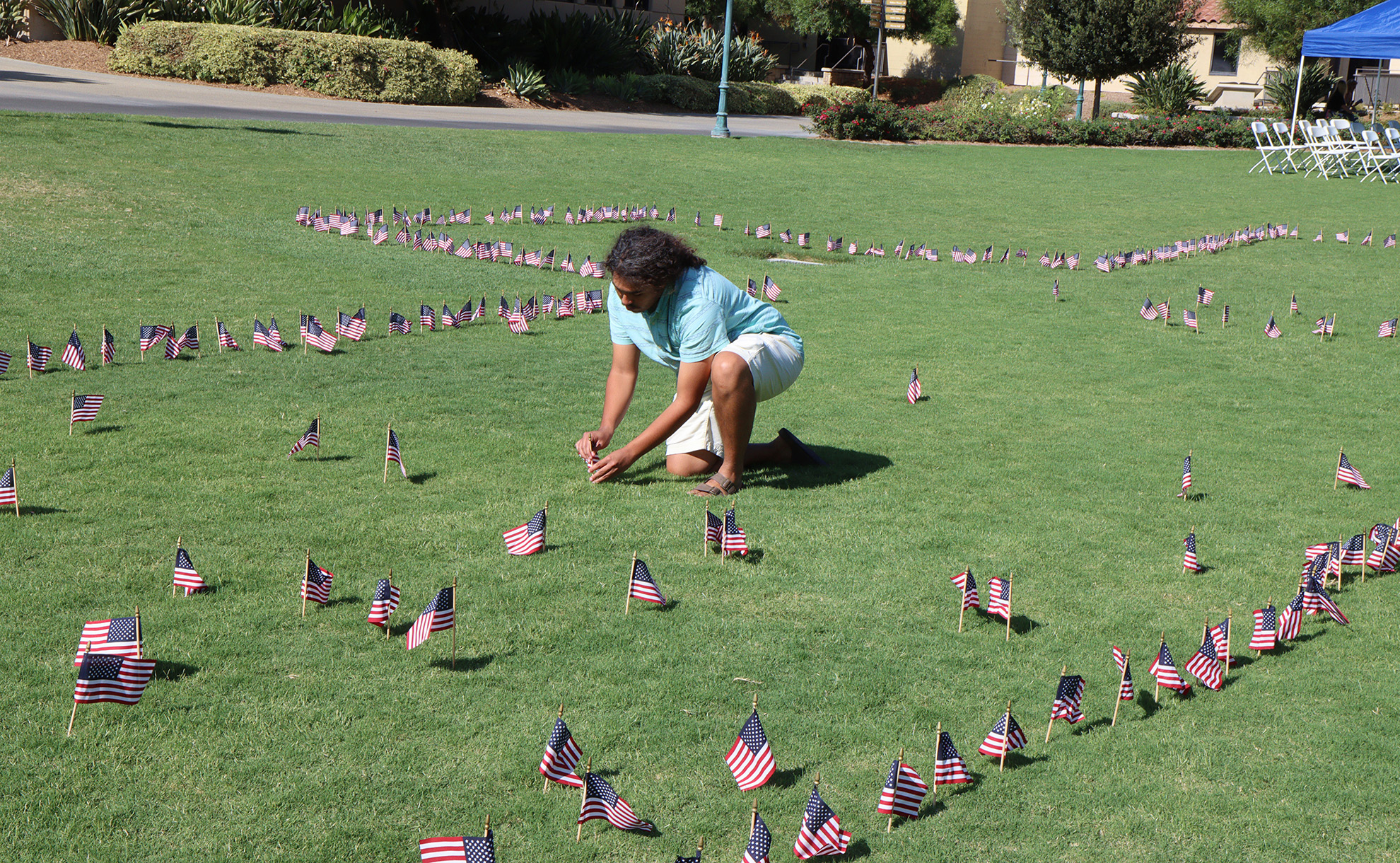 Students, faculty and staff at California Baptist University took time to commemorate the 20th anniversary of the 9/11 terrorist attacks.
Students, faculty and staff at California Baptist University took time to commemorate the 20th anniversary of the 9/11 terrorist attacks.
The Associated Students of CBU offered an opportunity to remember and honor the 2,977 people who lost their lives. At the Stamps Courtyard, students, faculty and staff could take one of 2,977 flags, one for each victim, and place the flag in the lawn, which was outlined as a cross.
“ASCBU and fellow Lancers are paying tribute to those who lost their lives in the events that took place 20 years ago at the World Trade Center [and the Pentagon], as well as honoring those who survived,” said Justice Avendano, a graphic design senior and ASCBU vice president. “Our generation barely recalls the events that took place on that tragic day. Remembering those affected connects us with our nation and promotes unity on our campus.”
Jenna Dickstein, a liberal studies sophomore, took time to plant a flag. She was born a month after 9/11, however, she has cousins who lived in New York and her dad was traveling that day and was stuck in North Carolina when flights shut down.
“Every 9/11 I really feel compelled to make sure everyone is aware of how tragic that day was and how many lives we really did lose,” Dickstein said.
She said she would encourage other students to watch documentaries if they need to inform themselves about the event.
“It is such a monumental date in our history, and I don’t want it to ever be forgotten,” Dickstein said.
Dr. Chris McHorney, chair of the department of history and government, said that even as years go by, it is important to remember the attacks because their effects are still being felt.
“Families and friends continue to mourn those senseless deaths,” McHorney said.
“In addition, our lives changed dramatically, with the consequences ranging from increased inconveniences when traveling, to the invasions of Afghanistan in 2001 and Iraq in 2003. The military has paid a heavy price in both wars, with thousands making the ultimate sacrifice and countless more returning home with significant visible and unseen injuries,” McHorney said.
Damian De Casas, a biology senior, remembers his elementary teacher turning on the TV and his parents trying to explain it when he got home from school. He stopped to plant a flag to remember 9/11 and the soldiers recently killed in Afghanistan.
“My hope and prayer for this country is that things can get better and God can provide,” De Casas said.
His faith helps him see how God can work through difficult times, he said.
“The amount of people who showed up in church after 9/11—people were seeking answers to questions about life, loss, everything. So, through faith, I think it’s important to remember that God is trying to bring people closer,” De Casas said.
CBU receives high rankings in 2022 “Best Colleges” lists
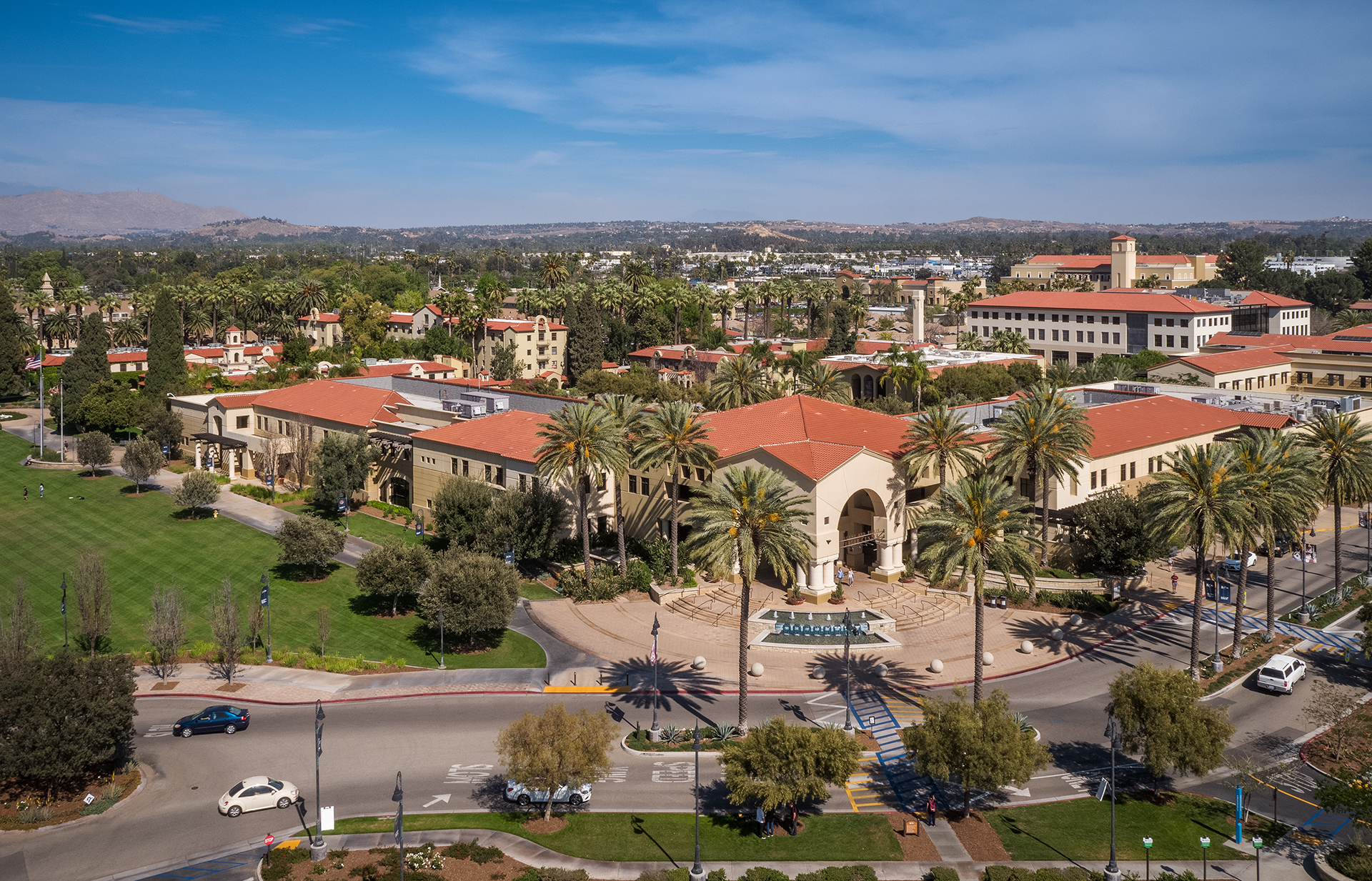 California Baptist University received multiple high rankings in the U.S. News & World Report (USN&WR) 2022 list of America’s “Best Colleges” announced Sept. 13.
California Baptist University received multiple high rankings in the U.S. News & World Report (USN&WR) 2022 list of America’s “Best Colleges” announced Sept. 13.
CBU claimed the No. 34 spot for “Best Regional University” in the West, up from last year’s No. 40 position. The 2022 rankings mark the eighth consecutive year that CBU has received a top-50 ranking in the publication’s “Best Regional Universities” category for public and private colleges in the West.
The 2022 rankings mark the 16th year that CBU has appeared in the “Best Colleges” list.
CBU also earned significant placement in several other 2022 USN&WR rankings including: No. 3 for “Most Innovative Schools”; No. 6 for “Best Undergraduate Teaching”; No. 27 for “Best Colleges for Veterans”; No. 27 in the “Best Value Schools” category; and No. 29 for “Top Performers on Social Mobility” (based on enrolling and graduating students who received federal Pell Grants).
Dr. Ronald L. Ellis, president of CBU, said the third-party ranking is significant.
“These rankings validate the choices made by thousands of students pursuing their higher education goals at CBU,” Ellis said. “This year’s ranking in particular reflects the quality of education that California Baptist University strives to provide in order to enhance students’ overall experience, even while dealing with a global pandemic.”
The “Best Regional Universities” category compares nearly 600 institutions in four regions of the nation that offer a broad scope of undergraduate degrees and master’s degrees but few, if any, doctoral programs.
CBU offers seven doctoral programs, 40 graduate programs and more than 100 bachelor’s programs.
U.S. News & World Report publishes the “Best Colleges” rankings each year to aid prospective students and their parents looking for the best academic values for their money. Now in its 37th year, the annual comparative listing uses a system of weighted indicators of academic excellence to rank universities. Those indicators include student selectivity; retention and graduation rates; assessment by peer institutions; faculty resources; financial resources and alumni giving, according to the USN&WR website.
To view the 2022 rankings, click here.
Family Updates
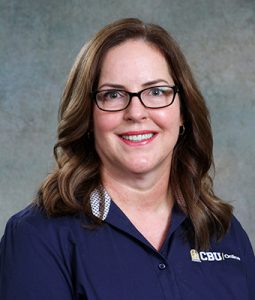
Dr. Cammy Purper
Dr. Cammy Purper, professor of education, and Dr. Shari Farris, associate professor of education, both for Online and Professional Studies, co-authored an article published in Exchange magazine (September/October 2021). It was titled All I Really Needed to Know: Leadership Lessons from Teaching Young Children.
Ashley Sonke, nursing student services coordinator II, and Dr. Terri Thompson, associate professor of nursing, published an article in the Journal of Professional Nursing. It was titled Multiple Mini Interviews as Part of Holistic Admissions Review for Nursing Schools.
Dr. Gretchen Bartels-Ray, associate professor of English for Online and Professional Studies, had a poem published by Kairos Literary Magazine (April 2021). It was titled Apricot Rose.
Dr. Mark Kling, associate professor of criminal justice, and Dr. Linda-Marie Sundstrom, associate professor of public administration, both for Online and Professional Studies, virtually presented research at the International Public Administration Conference on Sept. 8. It was titled Defund the Police or Comprehensive Compassion: Place-Based Governance Trends to Create Safety in the Civic Square.
Dr. Daniel Prather, professor of aviation science, presented a webinar hosted by the Airport Cooperative Research Program of the Transportation Research Board on Sept. 13. It was titled Airport Operations Training at Small Airports.
Dr. Trevor Gillum, professor of kinesiology, was elected president of the Southwest chapter of the American College of Sports Medicine. He will serve a three-year term overseeing the board of directors. Additionally, Gillum was recognized as a Fellow of the American College of Sports Medicine. The honor recognizes distinguished professional achievement in research and service.
Dr. Jacqueline Gustafson, dean of the College of Behavioral and Social Sciences, co-authored a paper published in the Journal of Human Behavior in the Social Environment (August 2021). It was titled Participant reflections on short-term international volunteering: Benefits, concerns, and perspective change.
Dominick Dicus, adjunct professor of English, published a short story on Assisi: An Online Journal of Arts & Letters (June 28, 2021). It was titled Aya.
Dr. Liya Grace Ni, professor of electrical and computer engineering, presented a paper at the Intelligent Systems Conference (IntelliSys) held virtually on Sept. 2-3. The paper was titled Small Scale Mobile Robot Auto-Parking using Deep Learning, Image Processing, and Kinematics-based Target Prediction. It was co-authored by Ni and student Mingxin Li, who graduated from CBU in May 2021 with a Master of Science degree in Electrical and Computer Engineering. The conference proceedings were published as a book called Intelligent Systems and Applications, as part of the Lecture Notes in Networks and Systems book series.
Srisha Jhangiani, a graduate student in the physician assistant studies program, has been awarded a National Health Service full ride scholarship. The organization bases selection on honoring legal obligations, performing well academically and a commitment to providing primary care services in underserved communities.
Dr. Erin Smith, associate professor of psychology, had a book review published in Perspectives on Science and Christian Faith (September 2021). She reviewed the book Enhancing Christian Life: How Extended Cognition Augments Religious Community by Brad D. Strawn and Warren S. Brown.
Dr. Robert Shields, director of curriculum development, and Dr. Dirk Davis, associate vice president of academics, both for Online and Professional Studies, presented an ePoster at the 2021 Distance Teaching and Learning 37th Annual Conference on Aug. 2. The presentation was titled Back to Basics: Redefining the Role of Faculty in Online Course Development.
Dr. Esther Lee, associate professor of statistics, published a paper in the Journal of Management Policy and Practice (Volume 22, No. 2). The paper was titled Forecasting COVID-19 Cases With Government Intervention Comparisons: Lockdown, Trackdown, and Herd Immunity.
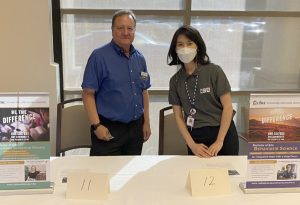
Dr. H. Bruce Stokes and Dr. Sophia Mun
The College of Behavioral and Social Sciences held an Undergraduate Kickoff Rally on Sept. 9. The rally welcomed new and returning students to campus and connected them with faculty. Faculty also presented information about student opportunities with the CBSS including global engagement practicums, research opportunities, and the new Bachelor’s of Social Work program.
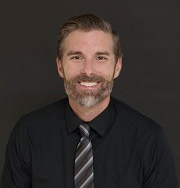
Dr. Joshua Knabb
Dr. Joshua Knabb, professor of psychology, presented at the American Association of Christian Counselors World Conference in Orlando, Florida, on Sept. 15-18. The presentation was titled ACT for Christian Clients in Counseling and Psychotherapy: A Faith-Based Approach to Living a Life of Purpose in a Suffering World He also won the 2021 Caregiver Award for Excellence in Christian Caregiving. Additionally, he, Dr. Veola Vazquez, professor of psychology, and Dr. Robert Pate, associate professor of psychology, published an article in Spirituality in Clinical Practice (Sept. 13, 2021). It was titled The Christian Gratitude Scale: An Emic Approach to Measuring Thankfulness in Every Season of Life.
Dr. John Park, assistant professor of psychology, and his wife, Yeji Hwang, welcomed a son on Sept. 11. Roy Park weighed 8 pounds, 3 ounces.
Dr. Julie Goodman-Bowling, associate professor of anthropology, and her husband, David Bowling, welcomed a son on Sept. 6. Edwin Mitchell Bowling weighed 6 pounds, 11 ounces. He joins sisters, Elizabeth, 6, and Emma, 4.
Personnel Updates
